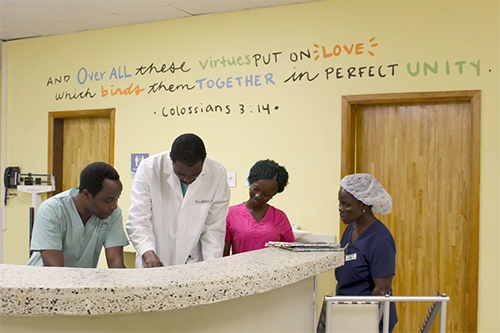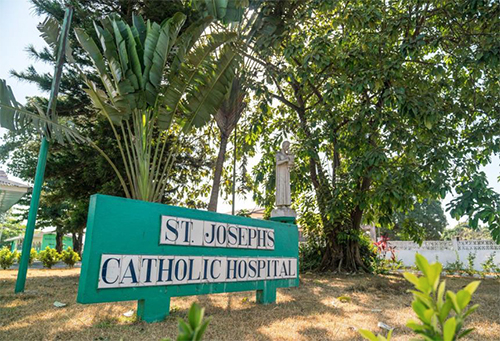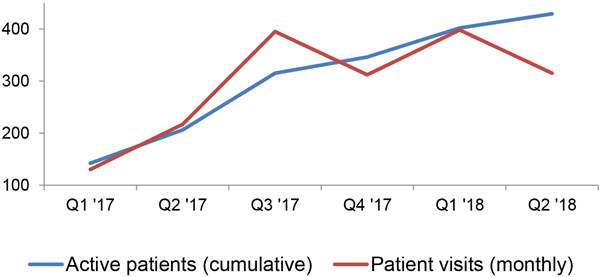This technical brief describes the Advancing Partners & Communities (APC) Project’s engagement with two faith-based health facilities in Liberia, Eternal Love Winning Africa (ELWA) and Saint Joseph’s Catholic Hospital (SJCH). These faith-based organizations received direct support from APC to provide comprehensive health care services to the Ebola survivor community.
Background
On March 23, 2014, the World Health Organization (WHO) reported cases of Ebola Virus Disease (EVD) in the forested rural region of southeastern Guinea. The identification of these early cases marked the beginning of the West Africa Ebola epidemic, the largest in history. The 2014-2015 EVD epidemic claimed over 11,000 lives across West Africa, with over 4,800 of these deaths occurring in Liberia. Throughout the course of the epidemic, there were over 10,600 EVD cases.1,2 The outbreak brought heavy social and economic losses to the already vulnerable country. The country’s already precarious health system was deeply impacted by the outbreak—routine health service provision and use declined due the redirection of health workers to handle the outbreak, fears about contracting the virus, and health facility closures.
The Ebola Transmission Prevention & Survivor Services (ETP&SS) program in Liberia improved access to health care and psychosocial services for Ebola virus disease (EVD) survivors through the provision of direct services by private faith-based organizations and the strengthening of services and clinical and technical skills of health providers in public facilities. The program focused on building health system capacity for treating the health complications that many Ebola survivors experience. The ETP&SS team also collaborated actively with the Ministry of Health (MOH) and the National Ebola Survivors Network of Liberia (NESNL) to ensure that systems to mitigate a reappearance of EVD are in place.
APC’s decision to engage these two faith-based hospitals was based on their commitment to survivors during and after the Ebola outbreak as well as a recognition that faith-based hospitals often contribute a unique mix of resources, capabilities, institutional knowledge, and deep community ties when providing health care services in limited resource settings. The health care needs of EVD survivors are diverse, and include basic primary needs, as well as specialized care, particularly ophthalmic, mental health, and rheumatologic care.
Interventions
In recognition of the long-standing relationship between faith-based organizations and communities in Liberia, ETP&SS forged partnerships with the Eternal Love Winning Africa (ELWA) and St. Joseph Catholic Hospitals through service grants. These hospitals have served the Liberian population for over five decades, actively supported the Ebola response during the outbreak in Liberia, and are well-regarded by the local population in general -- and the EVD survivor community in particular. These partnerships have enabled the two faith-based hospitals to maintain and expand primary and secondary health care service delivery for survivors.3 Survivors who present with official National Ebola Survivor Network (NESNL) identification cards, which were produced by APC in collaboration with the NESNL, are eligible to receive medical and mental care from these faith-based hospitals.

ELWA staff reviewing patient charts
ELWA Hospital
ELWA Hospital was founded in 1965 by the Serving in Mission (SIM) organization with the mandate to serve the medical needs of the community surrounding the SIM/ELWA compound in Paynesville, a suburb of the capital city of Monrovia. The 85-bed hospital has an average daily caseload of 180 clients per day and provides primary and secondary care.ELWA provided clinical care for survivors following the epidemic. In 2016, ELWA requested support from APC to enable the hospital to continue providing medical care for survivors.
Prior to receiving direct support from APC, ELWA received private funding to deliver diagnostic, medical, and surgical services to approximately 150 EVD survivors at no cost to the clients. As ELWA’s funding needs for these survivor services increased over time, the hospital sought additional funding to ensure that clinical services for survivors could continue without interruptions in service delivery.
ELWA was identified as the ETP&SS program’s first faith-based partner on the basis of the hospital’s specialized skills, and positive reputation among survivors, and their experience treating Ebola patients during and after the EVD epidemic. In October 2016, pursuant to its second core objective of “improving access for Ebola survivors through health facilities that care for survivors,” ETP&SS established a service grant that allowed ELWA to provide free, primary and secondary medical services to survivors, including comprehensive services to survivors, including medical, psycho-social, surgical, dental, ob-gyn, radiology, and laboratory services. The sub-grant provided 21 months of support to ELWA from October 1, 2016 – June 30, 2018, and enabled ELWA to deliver services to 279 registered survivors. See Figure 1 for a breakdown of services provided to survivors by ELWA through the grant.
Access to International Medical Specialties (AIMS) program: ELWA sponsors an international referral program for patients with specialty care needs that cannot be provided in-country, the AIMS program. One of the first survivor patients prioritized by ELWA and supported by APC required sequelae-related oral & maxillofacial surgery. The patient’s surgical needs could not be met within Liberia, so ELWA and APC coordinated to have the patient’s diagnostic needs provided in Sierra Leone, and surgical care provided in Ghana; this care was delivered through the AIMS program and was supported by APC.

St. Joseph Hospital grounds
Saint Joseph’s Catholic Hospital
To expand additional support to survivors, APC identified a second faith-based facility with a proven record of providing diagnostic, medical, and surgical services to EVD survivors during and after the Ebola epidemic. Saint Joseph’s Catholic Hospital (SJCH) is located in Congo Town, also a suburb of Monrovia. The hospital has 120 beds, sees an average of 85 clients for outpatient services, and provides primary and secondary care.
While SJCH had the specialized skills and reputation to treat survivors, it did not have adequate funding to support a comprehensive survivor care program. Sub-granting to SJCH supported the APC/ETP&SS program’s second objective of improving access for Ebola survivors for needed healthcare services and medicines through hospitals and clinics that care for survivors and combat stigma and discrimination among providers. APC provided financial support to Saint Joseph’s Catholic Hospital for a period of fourteen months, from May 1, 2017 – June 30, 2018.
SJCH was selected to receive support because of their widely regarded positive reputation for providing care to the EVD survivor community during and immediately after the EVD crisis in Liberia. The funding from APC enabled SJCH to extend access to medical services to a broader range of EVD survivors, particularly those experiencing severe economic hardship associated with their status as survivors. SJCH has earned the trust of the Ebola survivor community, is providing health care services to a high proportion of survivors in the country and has become a key referral facility where survivors feel confident that they can actively seek primary and secondary care without cost.
Results
Figure 1 captures the range of services provided by ELWA and SJCH over their respective periods of performance. Combined, ELWA and SJCH have provided over 1700 patient visits to over 400 registered survivor patients. Notably, over 20% of the total EVD survivor community have registered at either of the two faith-based hospitals; this reflects a high degree of patient confidence in these health facilities. The data indicate that through the partnerships with these faith-based hospitals, ELWA was able to maintain and expand the provision of free care to survivors, while SJCH was able to broaden their efforts by providing free primary and secondary health care services to registered survivors.
Figure 1. Services provided by faith-based facilities (through May 31, 2018)
| Indicator | ELWA | Catholic |
|---|---|---|
| Total # patient visits | 1196 | 571 |
| Total # registered | 290 | 139 |
| % of survivor community registered at HF (estimated survivor population=2000) | 14.5% | 6.9% |
| Total # surgeries | 11 | 9 |
| Total # lab tests | 2071 | 954 |
| Total # deliveries | 15 | 1 |
Figure 2 below captures an aggregated summary of survivor care received at ELWA and SJCH, illustrating the rapid increase in the number of active patients (cumulative) over time as well as monthly patient visits.
Figure 2. Summary of survivor care at FBOs

Conclusion
APC’s experience working with ELWA and SJCH has highlighted ways in which FBOS are uniquely qualified to function as effective health care service delivery partners. Historically FBOs tend to have a long-term presence in their communities and are mission driven in all aspects of their work; these qualities enable deep community engagement and buy-in and continuity of service delivery. Additionally, FBOs such as ELWA and SJCH have diverse, flexible private funding sources which allow important programs to: (1) complement project-specific funding from traditional development donor partners, and (2) continue and adapt to evolving donor landscapes. While the APC program activities at ELWA and SJCH are ending in mid-2018, both hospitals have recognized the value their survivor programs – in the context of national and global security – and are exploring ways to sustain their efforts for providing survivor care at no cost to registered survivors.
1 This case count includes all suspected, probably, and confirmed cases.
2 2014-2016 Ebola Outbreak in West Africa. Centers for Disease Control and Prevention.
3 The hospitals provide any diagnostic, medical, and/or surgical care needed by survivors registered with the APC ETP&SS program. To be classified as “registered” survivors must have met criteria set by the Ministry of Health and documented in the National Ebola Survivors Care and Support Policy 2016.
